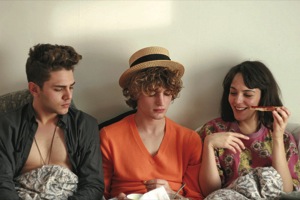
It’s a tale as old as time: A young gay man and his best girlfriend fall in love with the same beautiful boy. This plot and its lesbian equivalent have been at the center of entirely too many bad independent films. I don’t think it is so overused because it’s such a great storyline, but rather because it is such a central experience to so many young gays and lesbians.
Usually, our first heartbreak is caused by falling in love with an unbending heterosexual, and one of the worst fights we ever have with a straight friend is over the attentions of a mutual attraction. Unfortunately, this sort of juvenile drama can lead to some achingly juvenile movies, the cinematic equivalent of tenth grade love poetry.
So, you might expect that Heartbeats, a film about such a topic made by a near-juvenile, a 21-year-old gay man, would be shallow, clichéd and even grating. You would be wrong, because the 21-year-old in question is Xavier Dolan, the French Canadian wunderkind whose first movie, I Killed My Mother, was made when Dolan was 19 and won three awards at the Cannes Film Festival. Dolan wrote, directed and stars in Heartbeats, one of the most beautiful and original gay films I’ve seen in years.
Dolan plays Francis and Monia Chokri plays Marie, two Montreal hipsters who fall madly in love with Niels Schneider’s Nicolas, a college student who looks like a less buff version of Michelangelo’s David. At first, Francis and Marie are in friendly competition with each other, but soon their obsession with Nicolas frays, and then rips apart not just their friendship but also their own emotional stabilities.
Complicating this is Nicolas’ uncertain sexuality and unclear affections, as well as, it seems, his narcissism. Dolan splices into the drama monologues by several men and women discussing their own romantic failures, making it clear that Dolan recognizes the universal nature of the main drama.
In addition to being a precociously talented writer and director, Dolan is also a most excellent actor, and Francis’ inexperienced desire is achingly real. But Dolan doesn’t steal the film from his co-star; Marie, impeccably dressed in vintage dresses and matching hair styles and always sporting a cigarette, is haughty and often hilarious, in her modish personal style. But Chokri ingeniously shows how that veneer is just a cover for a deeper need, for sadness.
Dolan’s direction is enormously stylized, with rich, almost Fauvist colors, and camera shots framed so carefully that any film still could be mounted and hung in a museum. But, to me, it never feels pretentious. While some directors use that kind of beauty arrogantly and without thought to its dramatic effect (Michael Bay, for example), Dolan manages to make this kind of direction emotionally encompassing, even sublime. Slow motion shots of Marie chain-smoking or Francis crying, underscored by French pop songs, are the visual equivalent of emotional angst that 10th grade love poetry always fails to connote.










